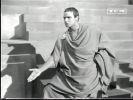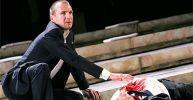 I went twice to the Teatro Espanol this week, to see Mr. Fiennes performing as Mark Anthony in the steps of the Capitol. "Twice?" - the incredulous Honourable Reader might ask. Twice indeed. If you can do it (and afford it) there's no better way to engrave in your memory something of which there will be no video or DVD or electronic recording of any kind. I did it just a few times, in fact. Among them a "Nutcracker" at the Gulbenkian Foundation, some thirty years ago, where my ballerina-sweetheart at the time had a minor role, and Stoppard's "Arcadia" at the National Theatre (of course!). More recently a Comedie Française production of Tchekov's "Platonov", where I took in successive nights two very different sweet friends. The essence of scientific method (Claude Bernard's "la methode experimentale") is to repeat experiments where only one variable stands out. Everything else must remain constant (like temperature, forces applied or chemical environment) . When the "variable" is the person seated next to you, some original conclusions might be extrapolated from the experimentation.
I went twice to the Teatro Espanol this week, to see Mr. Fiennes performing as Mark Anthony in the steps of the Capitol. "Twice?" - the incredulous Honourable Reader might ask. Twice indeed. If you can do it (and afford it) there's no better way to engrave in your memory something of which there will be no video or DVD or electronic recording of any kind. I did it just a few times, in fact. Among them a "Nutcracker" at the Gulbenkian Foundation, some thirty years ago, where my ballerina-sweetheart at the time had a minor role, and Stoppard's "Arcadia" at the National Theatre (of course!). More recently a Comedie Française production of Tchekov's "Platonov", where I took in successive nights two very different sweet friends. The essence of scientific method (Claude Bernard's "la methode experimentale") is to repeat experiments where only one variable stands out. Everything else must remain constant (like temperature, forces applied or chemical environment) . When the "variable" is the person seated next to you, some original conclusions might be extrapolated from the experimentation. 
 I was not being rigorous at all. How can one compare cinematic apples with theatrical oranges? The fact is, the praise of the dead Cesar by his friend and chief of staff Mark Anthony remains the most important operative political speech of all times. The bravura performance under such adverse conditions is a masterpiece both in oratory and in manipulative skills. And both are essential to charismatic political leadership. Brando had so much charisma that the Roman populace would follow him anyway. But could Fiennes pull it off? Could he convince his Roman fellow-citizens and the audience at the Teatro Espanol? (Neither Miss Wednesday nor Ms. Sunday had seen Brando, demonstrating that relative movie illiteracy is not linked to a particular generation).
I was not being rigorous at all. How can one compare cinematic apples with theatrical oranges? The fact is, the praise of the dead Cesar by his friend and chief of staff Mark Anthony remains the most important operative political speech of all times. The bravura performance under such adverse conditions is a masterpiece both in oratory and in manipulative skills. And both are essential to charismatic political leadership. Brando had so much charisma that the Roman populace would follow him anyway. But could Fiennes pull it off? Could he convince his Roman fellow-citizens and the audience at the Teatro Espanol? (Neither Miss Wednesday nor Ms. Sunday had seen Brando, demonstrating that relative movie illiteracy is not linked to a particular generation).When you are seated in row 5 at the center-left side of the stalls ( or in row 4 in the center-right side) the whole experiment becomes extremely unfair to cinema and to Uncle Marlon. Ralph Fiennes gives it all and displays the full range of skills of an exceptional actor. As all demagogues know the trick to move the masses is to pretend to be one of them. Brutus couldn't hide he was addressing the Forum from a patrician, albeit democratic, perspective while Fiennes/Mark Anthony was the portentous demagogue, making the audience feel his real grief for the loss of Cesar and simultaneously taking political advantage of the sympathy generated by precisely that moving exposure of his emotions. Modulation of volume output, histrionics and, above all, the absolute mastery of rhythm and timing made the difference. (The almost metronomic quality of timing is the foremost quality of all great populist political speeches, not mattering if taking place in Nuremberg during a NSDAP congress, or in the Central Squares of Castro's Havana or Peron's Buenos Aires, or at the Westminster Parliament - dear Old Winston being probably the best orator of them all).
Deborah Warner's mise en scene of "Julius Cesar" is breathtaking. Playing with our shared imagery and experience of contemporary political leaders (the "suits", the hungers-on), of mega rock concerts (for many the sole experience of a rally for the masses) and of contemporary military interventions in Kuwait and Irak (Brutus in "Desert Storm" batlledress is awesome) , Ms Warner brings the play into immediate political relevance for us. Brilliant and much more effective than any documentary or journalistic research with an agenda.
The Plaza de Sant' Ana, where the Teatro occupies a side, was tropical rained on Tuesday, echoing the wondrous rain in Rome just before the Ides of March. On Sunday, pleasantly and invitingly warm, theater goers decided to have supper there. It took ages to get the tapas of anchovies and cheese, and a client who had arrived much later than me, who was seated at a neighbouring table, got his food much quicker. But then again he was Mr. Ralph Fiennes..
No comments:
Post a Comment